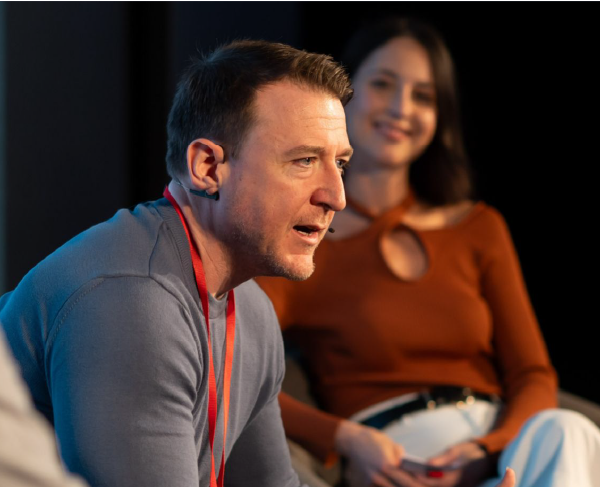
Blog
Recapping Legal Geek 2023: In Conversation with Clyde & Co
20 October 2023 | Jaeger Glucina, MD & Chief of Staff
Legal Geek represents one of the most exciting weeks in London’s legal calendar and this year’s conference certainly didn’t disappoint.
Taking to the stage on day two, I was delighted to be joined by Ben Parsons, Head of Digital, and Damian Rourke, Partner at Clyde Co, to discuss their AI journey since adopting Luminance in 2021. I’m fortunate to have worked closely with Clyde & Co from the very start of the partnership, so the opportunity to discuss how our AI has transformed the firm’s Casualty Practice stood out as a real conference highlight. In case you missed it, here’s a recap of our discussion.
The Beginnings of an AI Journey
We kicked things off with a discussion about what sparked Clyde & Co’s AI journey – were they driven by the need to address a specific problem or was it a case of being caught up in the industry’s excitement over AI? Damian explained that the Casualty Practice had started to receive feedback from clients that it was losing its competitive edge due an absence of technology-driven legal services and this “began to massively damage our ability to win work.”
This technological gap became all the more obvious when Clyde & Co was invited to a Dragon’s Den-style pitch to demonstrate their innovation offering and was forced to quickly put together an Excel-based solution. Despite making it to the final judging round, the hastily assembled Excel product was so manual that it wasn’t a viable platform for the firm moving forwards. With a clear need to maintain their competitive edge through AI-driven automation, Clyde & Co took to the market and landed upon Luminance.
Creating an AI-Enabled Practice
As personal injury claims represent such a specialist area of the law, I was interested to hear what Clyde & Co’s plan was for automating the claims handling process with AI. Ben outlined a few specific pain points that Luminance needed to address:
1. Large dataset analysis: the firm would typically receive gigantic, unstructured datasets from insurers consisting of medical reports, emails, PDFs and zip files. Analysing these vast data volumes posed a major time drain for Clyde & Co’s lawyers, who were manually reviewing each document.
2. Automated data extraction: 160+ datapoints needed to be extracted from the various reports when reviewing and building a case – a task previously completed via manual data entry into large spreadsheets.
3. Analysing medical reports: with no two medical reports exactly the same, the firm’s lawyers could take up to 20 minutes to manually read each document and identify key data. Notably, this was a low-value, time-consuming piece of work the firm wished to automate.
Spotting Insurance Fraud with AI
With a clear plan set out for Luminance’s implementation, I asked Damian when he started seeing value from our AI. His answer? Day one! He explained that, as he specialises in insurance fraud, he typically receives the details of an accident or injury across four or five different documents, which could take a full day to review. This presented the perfect scenario to put Luminance’s AI to the test and assess how effectively it could analyse key datapoints.
After uploading the first two documents into Luminance, the AI automatically began its out-of-the-box analysis, recognising key concepts such as the type of injury experienced by the claimant. Luminance instantly identified that in one report, the claimant had detailed an injury to their right thumb, whereas another document showed an injury to their left thumb. This discrepancy had gone unnoticed during manual review and was only picked up by Luminance towards the end of the case. As Damian explained, “My lawyers are good lawyers, but they’d missed it! The machine [Luminance] automatically picks it out and you think to yourself – that’s obvious, how did I miss this?”
During my time at Luminance, I’ve heard countless stories along the same lines and for me the lesson is clear: AI is made for the labour-intensive tasks that lawyers don’t need to exhaust themselves doing! A person’s expertise comes in the creative and strategic analysis involved in a case – not burning the midnight oil poring over page after page of text.
Delivering End-Value with Luminance
The results certainly spoke from themselves, so I asked Ben and Damian how they would classify the wider benefits Luminance’s AI has brought to Clyde & Co as well as its clients. They pointed out how firms in the insurance claims arena have historically sacrificed detail when reporting to clients due to the enormous volumes of data involved in each case. Now, as Damian summarised, Luminance’s AI “has given us the ability to feedback information to our clients at a granular level that allows us to build insight that other people can’t”. When pitching insurers for work, Clyde & Co can now offer a level of analysis with Luminance that is far greater than any competitor.
Looking Ahead
With so much achieved through Luminance’s AI in the Casualty Practice, I asked Ben to give the audience an insight into the future for Clyde & Co. Ben confirmed that other practice groups are now keen to emulate their success with Luminance, such as their US-based offices dealing with the current rise in asbestos claims. As Ben put it “It’s going to be a rolling programme of work over the coming months and years about how we can improve what we do across the entire firm for our clients.”

**Interested in learning about the value Luminance’s AI can deliver to your business? Find out today.